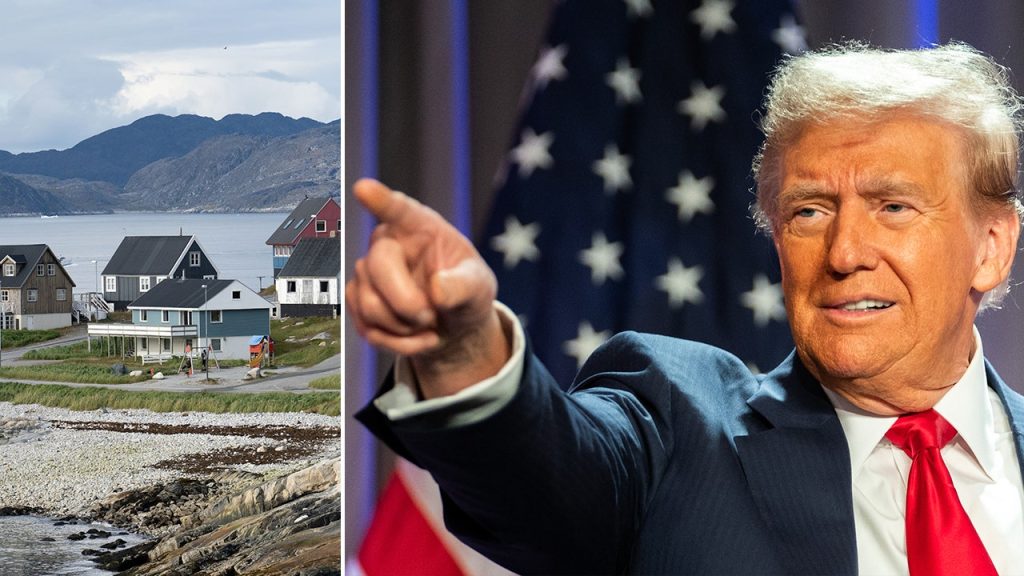In a recent statement, former President Donald Trump reiterated his administration’s longstanding interest in acquiring Greenland, citing international security concerns amidst growing Russian and Chinese naval presence in the Arctic. This assertion came as Vice President JD Vance, accompanied by Second Lady Usha Vance, traveled to the Danish territory, which the U.S. has eyed for potential acquisition since 2019. Despite Greenland’s government expressing a desire for greater autonomy from Denmark, Trump remains optimistic about securing the territory as a strategic asset for the United States.
| Article Subheadings |
|---|
| 1) Trump’s Emphasis on Greenland’s Importance |
| 2) Current Status of Greenland’s Independence |
| 3) The Role of the Vance Visit |
| 4) Historical Context of U.S.-Greenland Relations |
| 5) Future Implications for U.S. Foreign Policy |
Trump’s Emphasis on Greenland’s Importance
During a press briefing, former President Donald Trump highlighted the critical role that Greenland could play in the United States’ national security strategy. He pointed out the increased activity of Russian and Chinese naval vessels in Arctic waters, stating, “If you look at Greenland right now, if you look at the waterways, you have Chinese and Russian ships all over the place, and we’re not going to be able to do that.” This comment reflects Trump’s broader geopolitical strategy that emphasizes the need for the U.S. to bolster its presence in increasingly contested regions. By acquiring Greenland, Trump argued, the U.S. could enhance its military and surveillance capabilities in the Arctic.
Current Status of Greenland’s Independence
Despite Trump’s ambitions, the government of Greenland has articulated a clear stance against any potential acquisition. Greenland’s administration has been pushing for greater independence from Denmark, culminating in a call for outright sovereignty as the territory seeks to distance itself from Copenhagen’s governance. The Greenlandic Prime Minister has vehemently stated their disinterest in joining the United States, emphasizing a desire to explore self-governance. Local leadership has asserted that they aim to chart their own course and prioritize the interests of their indigenous populations.
The Role of the Vance Visit
Vice President JD Vance and Second Lady Usha Vance visited Greenland recently, accompanied by National Security Advisor Mike Waltz and Utah Republican Sen. Mike Lee. Their trip included a stop at the Pituffik Space Base, the northernmost U.S. military installation. This visit was significant, as it served both as a reaffirmation of U.S. interest in the region and an opportunity to discuss major issues affecting Greenland’s people. A senior White House official noted that the treatment of indigenous Greenlanders by Denmark would receive considerable attention during the visit, signaling the administration’s intention to engage with both territorial and international matters.
Historical Context of U.S.-Greenland Relations
The U.S.-Greenland relationship has its roots in World War II when the U.S. established military bases to protect its interests in the North Atlantic. Trump’s interest in purchasing Greenland, previously voiced in his first term, underscores the longstanding strategic importance attributed to the territory. Critics of the acquisition, however, point to Denmark’s enduring control and Greenland’s aspiration for independence as significant hurdles. Moreover, the territory’s resources, including oil and natural gas, have made it a focal point in the larger geopolitical landscape of Arctic interests dominated by Russia and China. Despite this historical context showcasing a multifaceted relationship, Greenland’s quest for autonomy complicates U.S. ambitions.
Future Implications for U.S. Foreign Policy
The ongoing discourse surrounding Greenland’s fate is reflective of broader U.S. foreign policy challenges. The Arctic has gained increased strategic importance due to climate change, which has opened new shipping routes and raised issues of resource access. The presence of Russian and Chinese interests in the region adds another layer of complexity, prompting U.S. officials to reconsider their approach to Arctic governance. Trump’s ambitions for Greenland’s acquisition resonate with a growing desire among policymakers to ensure American dominance in global affairs. However, how this aligns with respect for the self-determination of Greenland’s people remains a contentious issue.
| No. | Key Points |
|---|---|
| 1 | Former President Donald Trump reiterated U.S. interest in acquiring Greenland for national security. |
| 2 | Greenland’s leadership has expressed a desire for independence from Denmark and is opposed to U.S. acquisition. |
| 3 | Vice President JD Vance visited Greenland focusing on security and indigenous rights issues. |
| 4 | Historical ties between the U.S. and Greenland date back to World War II and military strategy. |
| 5 | The Arctic’s strategic importance is rising due to climate change and increased military activities by global powers. |
Summary
The situation surrounding Greenland illustrates a complex interplay of aspirations for self-determination, geopolitical strategy, and military interests. As the U.S. seeks to navigate its relationship with Greenland amidst aspirations for independence and the realities of international competition, the evolving dynamics in the Arctic will play a pivotal role in shaping future U.S. foreign policy. Ultimately, the balance between national interests and respect for local governance remains at the forefront of discussions regarding this strategically significant territory.
Frequently Asked Questions
Question: What is the significance of Greenland for the United States?
Greenland is viewed as strategically important due to its location and rich natural resources, which have implications for national security and geopolitical dynamics in the Arctic.
Question: How has Greenland’s government responded to U.S. acquisition proposals?
Greenland’s leadership has firmly rejected U.S. proposals for acquisition and is actively pursuing greater autonomy from Denmark.
Question: What role does climate change play in the Arctic’s geopolitical landscape?
Climate change is opening new shipping routes and increasing access to natural resources in the Arctic, prompting nations to bolster their military and economic presence in the region.
